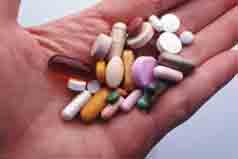Osteoporosis, which literally means "porous bone", is a disease in which the
density and quality of bone are reduced. As the
bones become more porous and fragile, the risk of fracture is greatly increased. The loss of bone occurs "silently" and
progressively. Often there are no symptoms until the first
fracture occurs.

The most common
fractures associated with
osteoporosis occur at the hip,
spine and wrist. The incidence of these fractures, particularly at the hip and spine, increases with age in both
women and men.
Of notable concern are
vertebral (spinal) and hip fractures.
Vertebral fractures can result in serious consequences, including loss of height, intense back pain and
deformity. A hip fracture often requires
surgery and may result in loss of independent living.
The good news is that
osteoporosis is now a largely treatable condition and, with a combination of lifestyle changes and appropriate medical
treatment, many fractures can be avoided.
Osteoporosis occurs when bones lose minerals, such as
calcium, more quickly than the body can replace them, leading to a loss of bone thickness (bone mass or density). As a result, bones become thinner and less dense, so that even a minor bump or accident can cause
serious fractures. These are known as fragility or minimal
trauma fractures.
For more Information visit:
http://www.rxpillsdiscount.com/










